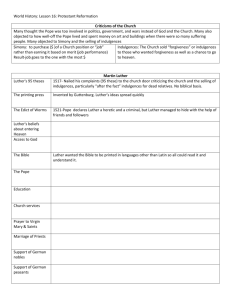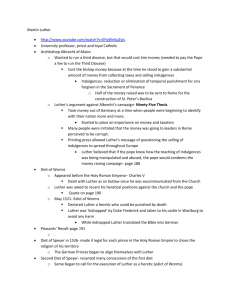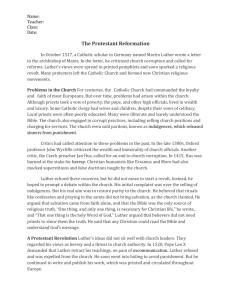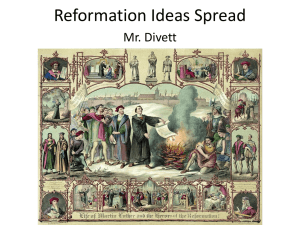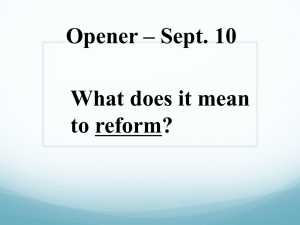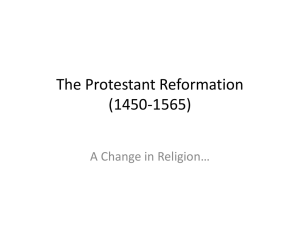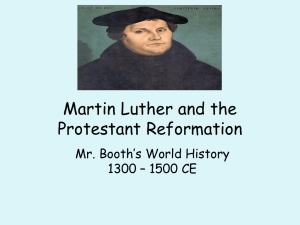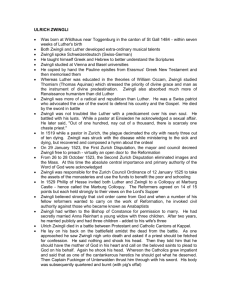File - Andrew Busch
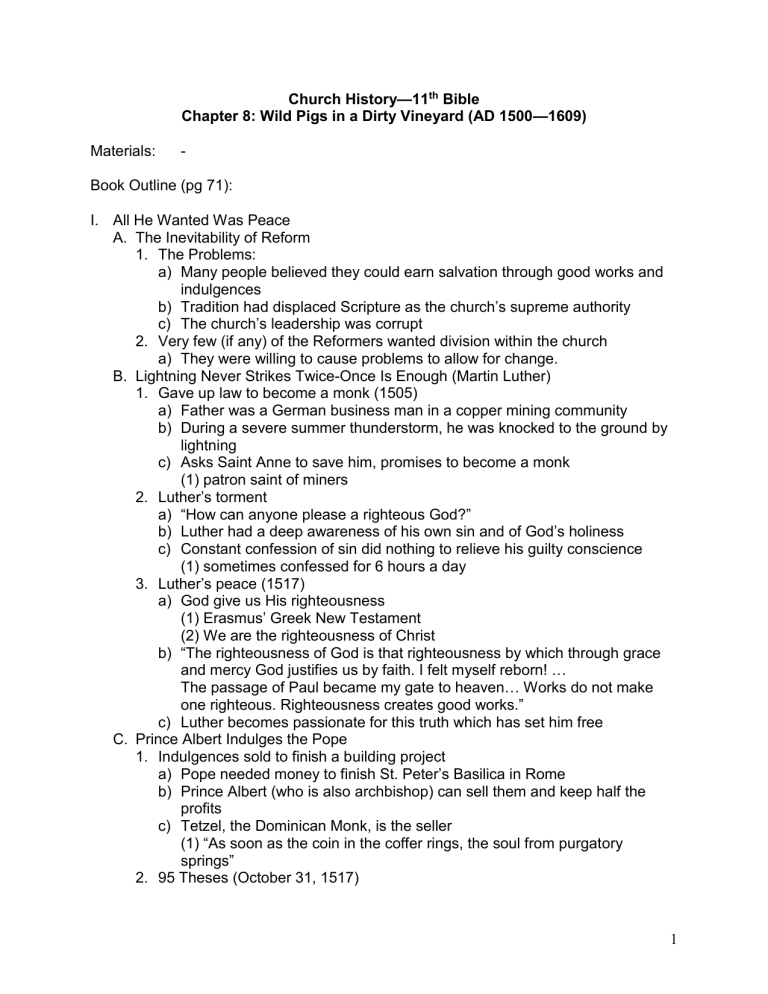
Church History
—11 th Bible
Chapter 8: Wild Pigs in a Dirty Vineyard (AD 1500 —1609)
Materials: -
Book Outline (pg 71):
I. All He Wanted Was Peace
A. The Inevitability of Reform
1. The Problems: a) Many people believed they could earn salvation through good works and indulgences b) Tradition had displaced Scripture as the church’s supreme authority c)
The church’s leadership was corrupt
2. Very few (if any) of the Reformers wanted division within the church a) They were willing to cause problems to allow for change.
B. Lightning Never Strikes Twice-Once Is Enough (Martin Luther)
1. Gave up law to become a monk (1505) a) Father was a German business man in a copper mining community b) During a severe summer thunderstorm, he was knocked to the ground by lightning c) Asks Saint Anne to save him, promises to become a monk
(1) patron saint of miners
2.
Luther’s torment a)
“How can anyone please a righteous God?” b) Luther had a deep awareness of his own sin and of God’s holiness c) Constant confession of sin did nothing to relieve his guilty conscience
(1) sometimes confessed for 6 hours a day
3. Luther’s peace (1517) a) God give us His righteousness
(1)
Erasmus’ Greek New Testament
(2) We are the righteousness of Christ b) “The righteousness of God is that righteousness by which through grace and mercy God justifies us by faith. I felt m yself reborn! …
The passage of Paul became my gate to heaven… Works do not make one righteous. Righteousness creates good works.” c) Luther becomes passionate for this truth which has set him free
C. Prince Albert Indulges the Pope
1. Indulgences sold to finish a building project a) Pope needed money to finish St. Peter’s Basilica in Rome b) Prince Albert (who is also archbishop) can sell them and keep half the profits c) Tetzel, the Dominican Monk, is the seller
(1) “As soon as the coin in the coffer rings, the soul from purgatory springs”
2. 95 Theses (October 31, 1517)
1
a) Luther gets angry when Tetzel sells indulgences to his congregation members b) Wants to debate Tetzel c) Nails 95 topics for debate to the church door
Out of love for the truth and the desire to bring it to light, the following propositions will be discussed at Wittenberg, under the presidency of the
Reverend Father Martin Luther, Master of Arts and of Sacred Theology, and Lecturer in Ordinary on the same at that place. Wherefore he requests that those who are unable to be present and debate orally with us, may do so by letter.
In the Name our Lord Jesus Christ. Amen.
1. Our Lord and Master Jesus Christ, when He said “Poenitentiam agite”, willed that the whole life of believers should be repentance.
2. This word cannot be understood to mean sacramental penance, i.e., confession and satisfaction, which is administered by the priests.
3. Yet it means not inward repentance only; nay, there is no inward repentance which does not outwardly work diverse mortifications of the flesh.
4. The penalty [of sin], therefore, continues so long as hatred of self continues; for this is the true inward repentance, and continues until our entrance into the kingdom of heaven.
5. The pope does not intend to remit, and cannot remit any penalties other than those which he has imposed either by his own authority or by that of the Canons.
6. The pope cannot remit any guilt, except by declaring that it has been remitted by God and by assenting to God's remission; though, to be sure, he may grant remission in cases reserved to his judgment. If his right to grant remission in such cases were despised, the guilt would remain entirely un-forgiven.
7. God remits guilt to no one whom He does not, at the same time, humble in all things and bring into subjection to His vicar, the priest.
8. The penitential canons are imposed only on the living, and, according to them, nothing should be imposed on the dying.
9. Therefore the Holy Spirit in the pope is kind to us, because in his decrees he always makes exception of the article of death and of necessity.
10. Ignorant and wicked are the doings of those priests who, in the case of the dying, reserve canonical penances for purgatory.
11. This changing of the canonical penalty to the penalty of purgatory is quite evidently one of the tares that were sown while the bishops slept.
12. In former times the canonical penalties were imposed not after, but before absolution, as tests of true contrition.
13. The dying are freed by death from all penalties; they are already dead to canonical rules, and have a right to be released from them.
…etc.
2
D. A Wild Pig, a Broiled Bull, and a Diet of Worms
1. Diet of Worms a) diet = meeting, Worms = the towns name
2. King of Germany requires Luther to come to discuss his writings.
3. He offers safe passage a) Remember Jan Hus?
4. Luther expected to die. a)
He couldn’t even answer the question as to whether he defended his writing when first asked. b) ‘Give me time to think it over’ i.e. ‘am I willing to die for this?’
5.
“My conscience is captive to the Word of God. I cannot and I will not recant anything, for to go against conscience is neither right nor safe. God, help me.”
6. Kidnapped by his friend, the ruler of Saxony, on the way home for safety
E.
“Other Women Have Even Worse Faults”
1. Katherine von Bora a) former Cistercian nun b) marries Luther
2. Reasons for marriage: a) It would please his father, b) provoke the Pope, c) and pass on his name
3. We know from his letters that Luther actually loved Kaetie very much.
F. How Is Christ Among Us? Or, Is He? (Communion)
1. Ulrich Zwingli a) Reformer from Zurich, Switzerland
2. Luther and Zwingli meet to see if the two movements can join together
3. The issue keeping them apart: communion a)
How is Christ present in the Lord’s Supper? b) Both think Transubstantiation is off but then what is the biblical alternative?
(1) T he elements don’t change outwardly but they actually transform into the body and blood of Jesus
(2) trans = change, transform
4. According to Luther a) The elements never change b) Christ’s body is mystically present with the elements
(1) “This is my body” c) Consubstantiation
(1) con = with
5. According to Zwingli a) The elements never change b) They are merely a symbol of Christ’s body and blood
6. Neither side could agree
7. Augsburg Confession (1530) a)
Luther’s followers publish their own statement of faith
II. All He Wanted Was A Place To Study
3
A. The Reforming Refugee (John Calvin)
1. Trained as a lawyer
2. Spoke out with a friend about the need for reform within the Catholic church
3. When violence broke out against Protestants in France, he flees to
Switzerland
4. Institutes of the Christian Religion a) first systematic theology of Protestantism b) orderly, logical account of what Christians believe based on the Bible c) i.e. “justification” studied as a topic throughout the books of the Bible
B. The Long Detour Home
1. Ended up in Geneva, Switzerland though he did not intend it.
2. Strife within Geneva a) Several years later, Calvin was forced out due to political and religious differences with the City council. b) Calvin went to Strasbourg, Switzerland and pastored the French protestants (Huguenots) c) Later Calvin was asked back to Geneva to debate a Roman Catholic theologian
3. Intellect a) He either preached or gave lectures every day and twice on Sunday b) He wrote commentaries on almost every book of the Bible
(1) He would dictate them to a scribe.
(2) His commentaries were based off of his own Latin translation of the
Greek and Hebrew scriptures instead of the Vulgate
III. All They Wanted Was To Be Obedient
A. Anabaptists
1. All the reformers up to this point grew up with the idea that civil and church governments were linked. a) The civil government enforced church doctrine and church unity
2. People who did not agree with the theology of the city they were in were often treated harshly a) Michael Servetus was burned at the stake in Geneva for denying the
Trinity b)
When one of Zwingli’s students suggested the Lord’s supper should be in the people’s language, Zwingli referred it to the city government
3. Felix Manz and Baptism a) Started a weekly Bible study in his home b) Came to the conclusion the New Testament never commanded infant baptism c) They openly criticized infant baptism (1524) d) During the Bible study, one of the members asked to be baptized with
“true Christian baptism, upon my faith” (1525)
(1) all the other members of the group also received believer’s baptism e) Anabaptists (Again-Baptizers) f) That night the city council of Zurich banished the Anabaptists
(1) note it was the city council not the church
4
g) The men fled but were chased down and put in prison. h) Felix was put to death by drowning
(1) 1 st non-Catholic to be martyred by Protestant hands i) Persecution of the Anabaptists spread quickly j) Heresies spread among Anabaptists even quicker
(1) with no leader or accountability, it was just anyone’s good ideas about what they thought the Bible said
B. The Munster Massacre (1535, Germany)
1. Anabaptists slaughtered by Protestant and Catholic princes a) They thought it was better for a few to die now, than for those few to lead hundreds astray and have them end up in hell too.
2. The only reformer to fight for the Anabaptists right to follow their own beliefs was Erasmus
3. By 1600 AD, about 10,000 Anabaptists had been murdered by fellow
Christians
C. Peace Amid Persecution
1. Menno Simons a) Dutch priest left his position and became an Anabaptist after studying the
Bible for 10 years b) The beliefs he pulled from the Anabaptists around him
(1) The church should baptize only believers
(2) No government should enforce religious beliefs c) Interpreted New Testament more literally
(1) actually washed the feet of people in his congregation
(2) refused to take oaths or to defend themselves in fights
2. Anabaptists became know as ‘Menno’s people’ or ‘Mennonites’. a) The Amish are an off-shoot of the Mennonites.
IV. All He Wanted Was a Bible That Everyone Could Read (William Tyndale)
A. Made the 1 st Printed English Translation of the Bible
1. His Bishop in England would not allow it.
2. He went to Germany (the hotspot for Reformation ideas) to publish his work
B. English Bishops purchased and burned most of Tyndale’s Bibles.
1. He used the money to keep making more.
V. All He Wanted Was A Son
A.
Henry the Eighth, I am, I am; the Head of the Church, I am”
1. Early in his reign, Henry was known as a friend of the Catholic Church a) Title: Defender of the Church by Leo X
2. Wanted an annulment from his current wife, Catherine of Aragon, because she had not had a son
3. The Pope refused (for both religious and political reasons)
4.
England’s archbishop went against the Pope and repealed Henry’s vows
5. Henry married Ann Boleyn a) who did not have a son and was later executed
6. Henry declared himself head of the English Church a) The Anglican Church (Episcopal in the U.S.) b) very similar to Catholicism
5
c) Henry wanted to b e in charge, he didn’t care what they believed
7. All who object are either killed or removed from their positions of authority
B. Lord! Open the king of England’s eyes
1.
Tyndale killed because he objected to Henry’s marriage. a) As he died he prayed God would open t he King’s eyes
2. 8 years later, Henry approved an English translation of the Bible based off
Tyndale’s work. He put one in every church in England.
3.
Jane Seymour (Henry’s 3 rd wife) has a son
4. Book of Common Prayer a) used in every church in England b) replaced Latin liturgies in church services c) England continues to move towards Protestantism
5. Queen Mary Tudor (Bloody Mary) a)
Henry’s daughter by his 1 st wife becomes queen after Henry’s son dies b) Tries to bring England back to Catholicism by force.
(1) kills 100s of Church leaders c) “We shall this day light such a candle by god’s grace as I trust shall never be put out” – Bishop Hugh Latimer as he was burned at the stake.
6. Queen Elizabeth a) Henry’s daughter by his 2 nd wife b) Rejects title of Supreme Head of the Church but also rejects the Pope’s authority c) Walks the line between Catholicism and Protestantism.
(1) The Anglican Church looks very similar to the Catholic Church today.
VI. All They Wanted Was Renewal
A. Attempts at Renewal
1. None of the Reformers wanted to break from the Catholic Church
2. They all wanted renewal within the Catholic Church
3. Some even tried to reunify the Protestants and Catholics. a) Luther’s aide: Philip Melanchthon
4. Re-unification was not stopped by the role of grace and faith in salvation but on the nature of the Lord’s Supper. a) Catholics had to have agreement with the Pope on Transubstantiation
B. Ignatius Loyola
1. Soldier wounded in battle.
2. Read Thomas A’Kempis’s Imitation of Christ while he healed. a) Emphasis on personal relationship with Jesus transformed his life.
3. Goes to Latin school with children, then to seminary
4. Founds the Jesuit order (society of Jesus)
5. Jesuits are the Catholic churches greatest missionaries ever. a) they preach all over the world
(1) 150 years before the Protestants send missionaries to those places b) the Catholic church begins to move towards renewal
C. Being Catholic in a Post-Reformation World
1. The Council of Trent (1538) a) Selling of indulgences and of church offices ends
6
b) Priestly celibacy was enforced again
(1) the officials in the church had looked the other way c) Scripture and church tradition given equal authority d) Both faith and works necessary for salvation e) Mass must be performed in Latin (until the 1960’s)
VII. The Aftermath
A.
The Reformation changes what ‘unity’ looks like in Europe.
B. Fragmentation of European society.
1. travel between countries and even provinces of different faiths was dangerous
VIII. Building Something Better
A. Were the Reforms of the 16 th Century desirable? Yes
B. Were the divisions of the 16 th Century desirable? No
C. Were they necessary? Probably
1. Sometimes God must break something we hold dear in order to build something better.
Go over Summary Page of AD 1500 – 1609 on page 80 with students.
Student Questions:
Chapter 8: “Wild Pigs in a Dirty Vineyard”
1.
What are three key controversies that brought needed reform as listed in the third paragraph in the first section?
1.
2.
3.
2.
Why would Martin Luther say that he “hated God”? What was the question that haunted
Luther?
3.
What did Luther discover concerning the definition of the word righteousness while studying
Erasmus’ Greek New Testament? Why would this discovery bring peace to Luther’s troubled soul?
4.
What issue prompted Luther to nail a list of 95 theses to the church door in Wittenberg?
5.
After three years of growing concern about Luther’s influence, what is demanded of him by the Holy Roman emperor?
6.
When Luther was asked if he would defend all of his writings, what was Luther’s response?
7.
How was Luther’s life spared at this time?
8.
Who was Katherine von Bora?
7
9.
Who was the leader of the Reformation in Switzerland? What was being sensed as two leaders and countries were working to renew the church, as they met in the German city of
Marburg?
10.
What were the two different positions taken by Luther and Zwingli concerning the Lord’s
Supper that kept the two movements apart?
11.
What is the Augsburg Confession?
12.
John Calvin was a French reformer and theologian. What is the title of his summary of
Protestant theology? Where did he spend most of his life teaching and preaching?
13.
Who were the “Huguenots” that Calvin cared for while he was in Strasbourg?
14.
What is meant by the statement that Calvin, Luther, and Zwingli “never escaped the idea that the church and the government could mingle”?
15.
What “radical idea” concerning the church and government arose in Zwingli’s Zurich?
16.
What other radical ideas did this group and their leader, Felix Manz, have concerning the
Lord’s Supper and infant baptism?
1.
2.
17.
Why were these early Swiss Brothers called “Again-Baptizers” or “Anabaptists”?
18.
What price did Felix Manz pay for his convictions? What is unique about his martyrdom?
19.
What two basic beliefs were salvaged by the Anabaptists, as led by Menno Simons?
1.
2.
20.
What New Testament practice is continued by this group? By what name did the Anabaptists become known as?
21.
What did William Tyndale say to a priest concerning a “plow-boy”? What did he desire to do to accomplish this mission?
22.
Why were so many of Tyndale’s English Bibles purchased by the English bishops? What did
Tyndale use the money for?
23.
What did Henry VIII want the Pope to do for him concerning his marriage to Catherine of
Aragon? What happened that allowed Henry VIII to marry Anne Boleyn?
24.
How did this situation eventually cost William Tyndale his life?
8
25.
Surprisingly, what does Henry VIII do several years later with Tyndale’s English Bible?
26.
What did Thomas Cranmer do to The Book of Common Prayer that led the English churches away from Roman Catholicism?
27.
What was unique about Queen Elisabeth’s rule and her revised
Book of Common Prayer ?
28.
In 1541, there was an attempt to reunite the Protestants and the Catholic reformers. On what point did the Catholics and the Protestants agree? On what two key areas did they disagree?
29.
Catholic reform would be led by a soldier named Ignatius Loyola. What would be his contribution to Catholic renewal?
30.
What positive changes were made in the Catholic Church following the Council of Trent
(1545-1563)?
1.
2.
31.
What three doctrinal stances were reaffirmed at the Council of Trent?
1.
2.
3.
32.
From a religious perspective, Europe was fragmented at the end of the sixteenth century.
Could it have been avoided, and can any good be seen in the divisions?
9


